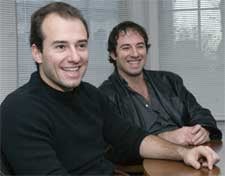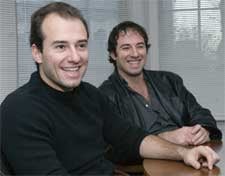 KINGSTON, R.I. –February 7, 2007—In some ways Evangelos Giovanis’ life reads like a film script. There’s rejection, acceptance, hard luck, hard work and above all a passion for filmmaking.
KINGSTON, R.I. –February 7, 2007—In some ways Evangelos Giovanis’ life reads like a film script. There’s rejection, acceptance, hard luck, hard work and above all a passion for filmmaking.
The credits began rolling in real life when his film “Land of Nod” won first place in the digital wave category at the International Thessaloniki Film Festival. The award came with a 15,000 Euro prize, nearly $20,000, and praise from film critics who hailed the 29-year-old as a “young Scorsese” and liken him to John Cassavetes. A Greek theater professor required his class to see the film.
The festival, which is held in Thessaloniki, Greece, showcases the work of new and emerging filmmakers. Famous directors, such as Francis Ford Coppola and Bernardo Bertolucci, have had their work shown at previous festivals.
Giovanis, who now lives in Johnston, became intrigued with filmmaking after taking some experimental film classes with associate art professor Sheri Wills at the University of Rhode Island. After graduating from the University in 2002 with a degree in English literature, he applied to film schools, but was rejected. Undeterred he and his brother George decided to become independent filmmakers.
Born two years apart, the brothers appear to be different sides of the same coin. While George is the rational head deciding the logistics, Evangelos is the heart creating emotionally charged scripts. “We inspire each other,” they say almost in unison.
Their independent filmmaking got off to an inauspicious start. Giovanis purchased a used digital camera online for $1,700. He never received it. “Let me put it this way, some Italian is having a cappuccino on me,” he says with a wide smile.
Piecing together an uncle’s loan, a hot streak at the Sarasota race track, and earnings from working full-time at a restaurant in Florida, the brothers shot their first feature film “Taking the Turn” about inner-city kids who mess up their lives. Although it had the technical difficulties of a first film, it was distributed on a small scale and can be found on NetFlix.
Giovanis wrote the script, directed, edited and had a small role in the film, which also stars his mother, father, and George. The family members proved to be good actors. “Don’t forget it was the Greeks who invented theater,” says Giovanis who was born in Warwick, R.I. but lived the first six years of his life in Ioannina, Greece.
“Land of Nod” which was made in Sedona, Ariz. is the brothers’ second film. In addition to writing the script, directing, and editing, he has the lead role. It takes an uncompromising look at the AIDs epidemic that Giovanis says has created fake sociality and the death of romance. His director’s note reads: “AIDS has destroyed the carefreeness and youth of my generation, and replaced it with fears and concerns that accompany the simplest interactions between people. It has altered the mental and physical consciousness of health, and transformed it into a hostile and helpless abyss. In its littered path it has left behind beautiful bodies that refuse to rot, and twisted sex into a puritanical myth complete with condom monsters, pill cocktails, and pandering money heroes.”
“There are no kittens and puppies in the film,” notes George. “It’s controversial and not politically correct.”
The brothers entered “Land of Nod” in American film festivals but heard nothing. They concede that their films are probably more suited to European audiences who prefer character and plot-driven films rather American films that tend to rely on action and special effects.
“Land of Nod” will be screened during URI’s annual spring Visualizations Film Festival, which is free and open to the public.
“In my classes, Evangelos was a galvanizing influence,” recall Wills. “He responded passionately to films I screened and to other students’ work. Evangelos really responded to the avant-garde films and his current work really reflects that influence. He has always worked with sophisticated themes and has a great eye for color and camera angle. His work often includes references to the beat poets and Greek myths. His films are intense and powerful.”
In addition to his film classes, Evangelos says the literature he read in classes taught by URI English Professors Jules Seigel, Richard Neuse, and Felix Okeke-Ezigbo influence all of his scripts.
Pictured above
Filmmakers Evangelos (closest to the camera) and George Giovanis. URI News Bureau Photo by Michael Salerno Photography.

